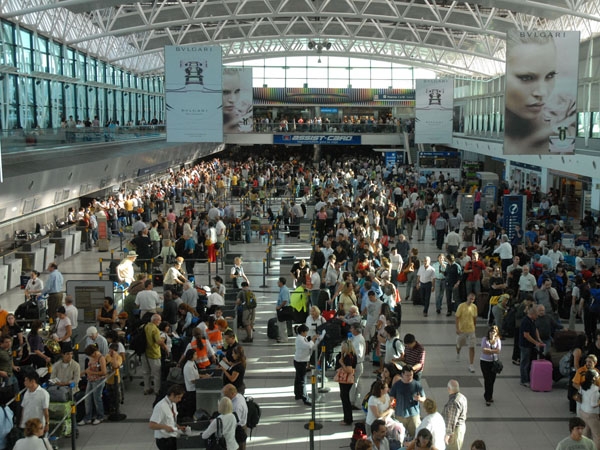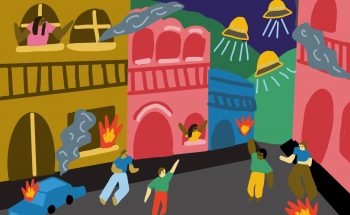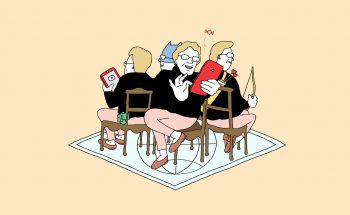
Translation: Another Country
Share:
Daniel Alarcón: Thank you for listening to Radio Ambulante. If you are looking for another podcast, I recommend Hidden Brain, with Shankar Vedantam. Hidden Brain is a mix of science and storytelling …. They explore the complexity of the world around us, looking or for the unexpected key that help us understand it better. Look for it on the NPR ONE app or at NPR dot ORG slash podcasts.
Welcome to Radio Ambulante, from NPR. I’m Daniel Alarcón. Now that we are part of NPR we want to share some of our favorite stories with our new audience. Let’s start here…
Alejandra: Do I have to say my last name also? Or just my name?
Daniel: You can say, I want to be called Maria, I want to be called…
Alejandra: Ok, Alejandra. My name is Alejandra and I am going to tell you about how I found an apartment in Buenos Aires…
Daniel: Okay, that’s just one part of the story. But not all of it. For starters, her name is not Alejandra – soon you will find out why she prefers not to use her real name.
Alejandra: And I was thinking “OK, I have to use this situation to my advantage. Because I need to come out alive [laugh], I have to come out with money and I have to come out of it without going to jail or any strange record tied to my name.”
Daniel: As you can see, things are going to get complicated. Today in Radio Ambulante, Another Country. We are in Buenos Aires in 2002. This is Camila Segura.
Camila: Alejandra moved from her city of birth, Seoul, South Korea to Buenos Aires, where she had spent most of her childhood and adolescence. This was the first time she was going to live in Argentina as an adult, without her family, and just like anyone else, she needed a place to live.
A Korean friend told her he had an apartment for her: big, nice, and, furthermore, cheap. Her friend, however, warns her that if she is superstitious, maybe she shouldn’t live there. Alejandra, being curious asks what he’s talking about, and her friend tells her that, not long ago, an Asian immigrant had been killed by stabbings in that apartment.
Alejandra: Since I am a person that I believe to be quite educated and not keen to believe such superstitions, plus, I was quite desperate to find an apartment because I needed a place to live…so I said, “fine”.
Camila: So she decides to check it out, one day, in the late afternoon. There wasn’t any electricity and there was very little natural light coming in. But she likes it and decides to take it. But when she goes back a few days later, with her things, ready to move, she notices everything she didn’t notice the afternoon she decided to rent it. The apartment had blood everywhere. In the bedroom, the bathroom, the kitchen…
Alejandra: Since the guy was assassinated and I guess nobody wanted to clean all the blood, it was up to me to clean everything. But, there was one problem: the mattress…it had blood in it. So I though, ok, I will clean it as well as possible with bleach and then I will cover it with one sheet or two, and that’s what I did.
Camila: And that’s not all. No matter how nice and cheap it was…
Alejandra: There wasn’t any electricity. At night I was sleeping with those kinds of lamps you use when you go camping. The whole ambience in general was…quite unsettling…
Camila: Nonetheless, she stays. She decides to stay in an apartment that had been the scene of a crime. She, in the dark, sleeping in a mattress stained by blood.
Welcome to Buenos Aires.
Once her living arrangement had been solved, Alejandra needed to find a job. She had a small scholarship at her university, but it wasn’t enough. One day a Korean guy from her new neighborhood told her there was an Argentinean who had a job for someone like her.
Alejandra: He didn’t tell me specifically what the job was about, he told me they needed someone with my profile…so I thought they were thinking of asking me to teach in a school or something of that sort…
Camila: Alejandra agreed to meet with them. The Korean guy, the Argentinean man, and two or three more people, got together for a BBQ. They were all associates, and that night they spoke about politics, about Argentinean society, about food…basically, general topics. But behind all of these was her job, a job, which they always referred as “the project.”
Alejandra: That’s the word they used, the “project”…and said that they obviously wanted to start a larger project, start with something which they wanted me to be part of – talking about the future a lot, of possibilities, etc, etc.
Camila: But without saying exactly what it was. At the beginning they didn’t talk about pay, nobody said, “your job consists of this and that”. No. With a glass of wine and a plate of steak, the Argentinean man started a speech almost philosophical, focused, above all, in a specific theme:
Alejandra: “There are many problems, with borders…But if one really thinks about it properly there shouldn’t be national borders.” Obviously I agree completely with that sort of speech. And later he started talking about how…”it’s good to help people, especially in the case of”…he was obviously talking about me…a person capable of helping others.
Camila: The capability of hers which seemed to interest them the most was her domain in several languages. Korean and Spanish, of course, but also English and Mandarin. Finally they at least said they would pay her real well, so they toasted for the project and Alejandra accepted the job. Is just that a woman who sleeps in a mattress covered in blood, doesn’t worry much about accepting a job without knowing exactly what it is about. Actually, the mystery was what attracted her the most about the job.
Daniel: We will be back after this break.
–MIDROLL–
Daniel: Thanks for listening to Radio Ambulante. All this month we are asking our listeners to tell a friend about a podcast they like. Call them, contact them on social media, and if they don’t know what a podcast is, well, explain it to them. If they don’t know how to listen, show them. And then tell us what podcast you recommended using the hashtag #TRYPOD. Thanks!
Daniel: Before the break, Alejandra was telling us about how she accepted a job she didn’t fully understand…Camila Segura continues the story…
Camila: This is what she tells us about her first day:
Alejandra: I was a little bit nervous but at the same time I am not usually a super nervous person, so, I was fine…We were in a car with two men of about thirty something years old, Chinese, me, and the Korean guy.
Camila: There was another Korean man, somewhat enigmatic, and the Argentinean man, the one from the BBQ. Together they went towards Ezeiza, the International Airport of Buenos Aires. Alejandra figured out her job had to do with the two Chinese men.
Alejandra: They didn’t speak Spanish or English, so I thought I was acting like a tourist guide…accompanying them to the Ezeiza Airport so I could help them with everything there, do all the paperwork, go through customs, the passport, and goodbye, have a good trip and that’s that…
Camila: Alejandra found it strange.
Alejandra: Because first of all, why were they in Argentina?, I asked them, “so you came to Argentina, what did you see?, etc, etc…did you go to the cemetery of Recoleta, this and that, and they hadn’t seen anything…which is super fishy – And then, I realized they didn’t look like Chinese men who have the luxury to travel…one can tell easily by the way they speak mandarin…so I felt everything was…not looking good…
Camila: At Ezeiza, Alejandra gets off with the Chinese men, and the rest stay in the car waiting for her. Everything went well, easy. She accompanies the Chinese while they go through customs, until they get on the plane, and then they leave. But everything seemed somewhat disconcerting to her.
Alejandra: So when I got to the car, I asked them, I asked the Korean guy and the Korean man: “So, what is it? Tell me…the truth,” okay? And the young guy was sitting there all quiet, sort of looking at the clouds, and the man tells me, “Look…this is a very important job, seriously, because we are helping the Chinese”, etc. etc…
Camila: That is to say, helping them immigrate illegally to the United States. And Alejandra, according to the Argentinean, was the one who could help them. But of course, they never refer to it as illegal. They would say something else: facilitate the trips.
Alejandra: That’s right, “facilitating”, that’s the word he used. Facilitating. I am not dumb, maybe naïve, but not dumb. That’s when I realized: Oh no, what I am doing is trafficking, right?
Camila: One of the illegal routes from China to the United States at that time passed by Brazil, with a layover in Buenos Aires, in order to get fake papers, and from there to Canada. No wonder the Chinese had not done any tourism. No wonder they hadn’t seen the Recoleta nor they had left their sad neighborhood.
Alejandra: I told them, “Look, this is illegal” right? “I am not Argentinean, they can deport me also.” So the young guy says, “No, nothing is going to happen, nothing is going to happen. I’ve done this for maybe five years, and this gentleman has done it for maybe, about 15 years, I am not sure how many”…
Camila: While there, sitting in the car, Alejandra remembers they have her passport. She had given it to them before starting to work, something she even acknowledges as naïve. In a way she was already compromised.
Alejandra: And I was thinking “OK, I have to use this situation to my advantage. Because I need to come out alive, I have to come out with money and I have to come out of it without going to jail or any strange record tied to my name.” It was a quite complicated situation, but I had one excuse: I didn’t know anything.
Camila: But she wasn’t innocent. Not exactly. Alejandra decided to continue with the job. Or better said, the project. It paid very well and required minimal effort. Every two weeks she would spend three hours with Chinese immigrants. She would translate for them and would train them for their brief interview with Ezeiza’s customs agents. They would ask her for advice. “What do I do if they ask me where I come from, and why I am in Argentina?” Alejandra would help them invent answers.
But the immigrants were not the only ones who invented stuff. Even Alejandra, to protect herself, reinvented herself every time she had to go inside the airport.
Alejandra: I started putting on costumes, wigs, glasses, and different types of outfits. Not costumes in the style of Mission Impossible. In a way, I am not sure if I should be thankful since there is so much racism, and people think all Chinese look the same, in quotes, but that also helped me. So I didn’t have to be so creative.
Camila: During the following two months, Alejandra had to accompany more than twenty Chinese immigrants in their illegal exit through Ezeiza. One day she left three Chinese, and when she was leaving, someone stopped her. It was an airport employee. He took her to an office at the end, without windows.
Alejandra: And later, another man, opens the door and says, “Ok, come on in.” I entered and they started showing me different photos of myself, with different people, with different travelers. It was obvious they had been taking photos from the beginning for almost two months. And I thought “Wow, I am in a movie.”
Camila: They asked her the basics: “Who are you? Who do you work for? Who are these Chinese people you always accompany? And just as she had planned, she acted dumb.
Alejandra: “I am just a tourist guide, I am a translator, because I am Korean and live in Argentina, now for my job, but since I speak Chinese I am helping these travelers, these tourists,” right? And he tells me, “Okay, I’ll let you make a phone call.” I called the Korean guy and the Korean man, and speaking in Korean I told them I was at the airport and there was a problem. The Korean man told me, “OK, wait a moment,” and after one hour a phone call comes through and they let me go.
Camila: But this doesn’t end there. As she was leaving, one of the security agents gives her his hand to say goodbye, and discreetly puts a paper in her hand. Alejandra doesn’t read it until she leaves the airport. The agent had set an appointment.
Getting entangled in this even more, or not. That was the question. When was she supposed to quit? And how does one know if one should get out of it now, because later may be too late? Her bosses, her coworkers, told her to go to the appointment, but they were after their own interests. Alejandra doubted she would go, but the day of, she decides to go. The agent had cited her to a cafeteria often full of people, located at the corner of a busy street. That, at least, made her worry less.
Alejandra: I found the guy and he tells me: “I know what you guys are doing, and it’s all fine…I don’t have any problem with it, but as you can see, I have a family, I have two girls, and with the economic situation here in Argentina…things are complicated.” He was obviously asking me for money.
Camila: Alejandra didn’t deny anything. She didn’t see the point since he knew it all. She explained to him she couldn’t make any decisions about his bribery because that was something she had to discuss with her bosses, so the agent changed the topic.
Alejandra: He started saying he had been attracted to me since the first day he saw me in the video camera. In a few words, he wanted me to sleep with him and if I did, he would help us, etc, etc. Obviously I wasn’t up to doing that, but I wasn’t going to tell him no right then and there, so I said “oh yeah, interesting, yes…” I was like La La La…right? Not saying yes or no.
Camila: Alejandra had learned to speak in the dismissive language of her colleagues and the corrupt policemen, and was able to handle it. But this conversation scared her. As she exited the cafeteria, she called her Korean colleagues, and told them what the agent had asked of her. The money, the bribery, all that could be solved easily. The other thing – wanting her to sleep with him – that was more complicated.
Alejandra: They started laughing saying he was a perverted man, like all Argentineans who are perverted and have a fantasy with an Asian woman.
Camila: The Koreans came up with a solution. They suggested it with an amazing coldness. They would give the agent a Chinese woman, one of the immigrants Alejandra was going to accompany.
This was the line Alejandra was not willing to cross. The speech of a supposed solidarity with immigrants, vanished at that instant. One thing is to help immigrants cross borders you consider fictitious, but…
Alejandra: It’s another thing trying to prostitute a person, forcing her…I said, “No, that’s wrong. That’s completely wrong,” right? “I can’t go there, and we are going to be done with this.”
Camila: And that’s how it happened. Alejandra abandoned the project in a disguised way. She invented excuses, and didn’t agree to anything. As far as she knows they didn’t prostitute anyone, or at least not because of her.
When I asked her why she did it, why she was part of that project. Alejandra answered like this:
Alejandra: Because I liked the transgression. It is obviously not a justification, but since I don’t believe in identities, I also don’t believe in borders, and I have very little faith in the law, because the law is something the poor need to obey, not the rich, right? The rich are always able to escape.
Camila: And she escaped too. One day, without telling her colleagues, she left Buenos Aires and left Argentina. To look for a new life, not in this country, but in another one.
Daniel Alarcón: Camila Segura is Senior Editor at Radio Ambulante. She lives in Bogotá. I produced this story with music from the Argentinean composer and percussionist Marcio Doctor. You can find more of his music in his website: marciodoctor.com. I highly recommend him.
The rest of the Radio Ambulante team includes Silvia Viñas, Luis Trelles, Elsa Liliana Ulloa, Barbara Sawhill, Caro Rolando, Melissa Montalvo, Désirée Bayonet, Ryan Sweikert, Luis Fernando Vargas, and David Trujillo. Andrea Betanzos is our intern. Carolina Guerrero is the CEO.
Radio Ambulante is produced and mixed on Hindenburg PRO.
Learn more about Radio Ambulante and this story on our website: radioambulante.org. Radio Ambulante tells the stories of Latin American I’m Daniel Alarcón. Thanks for listening.





